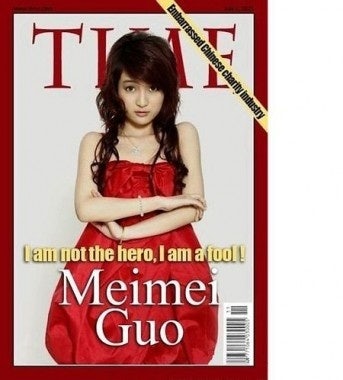Brands May See Sales Bumps From Online Scandals, But At What Cost?#

Guo Meimei shows off her luxury handbags (Image: Sina Weibo)
Conspicuous consumption may be very slowly going the way of the dodo among China's more sophisticated luxury consumers as disdain towards overt extravagance grows in major urban centers, but that hasn't stopped some from flaunting their wealth online in a blatant attempt at fame or notoriety. This summer, scandal broke when a young woman, Guo Meimei, who claimed to work as general manager of the Red Cross Society of China, posted photos of her many luxury handbags and cars on Sina Weibo. A firestorm of criticism, both of Guo and the Red Cross, soon ensued, despite the quick denial by the Red Cross of China, and admission by Guo herself, that she had ever been an employee. Chinese netizens regularly took to Weibo to ridicule Guo for flaunting her Hermès handbags and Maserati, causing online searches of both of these brands to skyrocket.
Any association with a scandal-hit celebrity -- self-styled or not -- is generally considered a bad thing for luxury brands, but in the wake of the Guo Meimei incident, the great irony is that Hermès may have seen a sales bump in China. According to statistics released by the Beijing-based World Luxury Association (WLA), Hermès sales have increased between 7-10 percent over the past three months, since the scandal broke, although these figures have not been verified by Hermès or any other authoritative organization. As WLA chief Ouyang Kun told China's CNR:
Guo Meimei claimed that she owned several Hermès handbags, so along with the scandal, the name 'Hermès' spread into second- and third-tier cities where the brand has yet to expand. Suddenly, Hermès had, without any effort, been established in the minds of people in these cities as a high-end brand. As such, the number of new Hermès customers jumped dramatically, around 40 percent, with most of them living in second- and third-tier cities.
Again, we can't confirm the WLA's figures, and Jing Daily remains skeptical of the organization's methodology, but if the Guo Meimei scandal did indeed bring about a sales boost for Hermès, it's important to note that there are two sides to every coin, and that not all media exposure is positive -- especially with the official Chinese-language media putting conspicuous consumption in the cross-hairs. As the Beijing Morning Post recently opined, Hermès is often singled out by those critical of the luxury industry in China as a "tool for bribery," or a brand upon which the nouveau riche remains fixated. As Jing Daily wrote earlier this summer, the popularity of Hermès in China recently came under attack from the China Central Television (CCTV) anchor and regular publicity stunt instigator, Rui Chenggang, who posted on his Weibo:
The Hermès Birkin handbag (for women) and leather ‘H’ belt (for men) are strong weapons for China’s nouveau riche and socialites to show off their wealth. However, Hermès handbags are just used by a few middle-age women in Europe and the U.S.

This satirical rendition of a TIME magazine cover went viral in China last month (Image: Want China Times)
Rui's remarks were roundly laughed off by other well-known figures in the Chinese media world, including Hong Huang, who wrote in response, “As a journalist, Rui isn’t even qualified to make these kinds of off-the-cuff remarks, and I don’t think his criticism will bother Hermès in the least.” Yet they show how a major luxury brand can remain an easy target in China, whether for Beijing (when it decides to crack down on advertising or stiffen its quality control inspections) or for opportunistic media figures, as sales and presence increase. For its part, Hermès seems to have taken the high road over the past several months, remaining silent (as have Maserati and the other luxury brands flaunted by Guo Meimei) about the scandal rather than engaging in intensive crisis management. Still, a brand as sought-after and globally revered as Hermès isn't really at risk from something as minor as the Guo Meimei scandal.
Younger or less established brands, however, need to be vigilant about any association, deliberate or not, with controversy. While brand recognition, and sales, in third-tier cities could increase, reputation in key first- and second-tier cities could suffer.